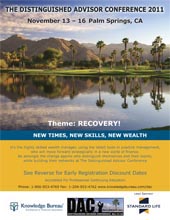Last updated: October 18 2011
Financial Stability a Must Today
By Evelyn Jacks
Where do you invest your money? That's likely the most salient question of the times.
There are so many ways to go wrong. A recent article in The Economist, summarized the historical fury of bear markets that have substantially wiped out wealth:
- In 1946 when bond yields were at their current 2.5% level, 75% of their value was lost in the following 25 years in Britain.
- When investors hurried into gold in its last peak in 1980, the price fell by 2/3 in the next 20 years that followed.
- By the year 2000, when the world was highly exuberant about the internet, the dividend yield on American equities was just one per cent; and the annual real equity return over the next 10 years just under that, .08%.
- In 2011, despite strong growth in India and China, emerging equity markets fell 23% in the third quarter; resulting in those shares trading on a discounted valuation compared to developed-market counterparts.
In Canada, we are comforted by strong banks and a strong, stable real estate market. Today residential housing development represents about 20% of the domestic economy, according to the Canada Mortgage and Housing Corporation, and rising real estate values continue to drive consumer confidence. What's noteworthy, however is that residential mortgages are the biggest single asset on Canadian bank balance sheets, according to an October 15 article by Postmedia News. What happens if the real estate bubble bursts? What could make it burst?
Demographics, for one thing. Will baby boomers downsize out of their empty nests? Will their 20 and 30-something children stop buying homes with all the uncertainty? Will they default on mortgages if we enter a deeper recessionary phase? How will that affect the balance sheets of Canadian banks? My co-author Robert Ironside says this:
"The issue with respect to the banks, should we have a major real estate correction, is of great concern. The banks are shielded somewhat by the existence of mortgage insurance on their high ratio mortgages but their income and asset growth would be significantly affected.î
Wealth preservation seems to be the name of the game today, but an additional issue is this: even if we are great savers, what will our current dollars buy in the future?If we hold on to the wrong things; we face the winds of financial erosion. Those winds include the potential for recession, deflation, inflation and taxes. Continuing to make new money is a strong defense.
This is easier if you have a stable income from employment or self-employment; much more difficult if you are living on a fixed income in retirement, although a savvy eye to investing in income-producing assets is important; so is an indexed pension plan. Managing tax and debt loads is something we can directly control, and both add points to your rate of return as well.
In other words, financial recovery begins at the micro level; with financially stable households.
It's Your Money. Your Life. It makes sense to get your financial affairs in order in this climate. Managing debt loads, especially mortgage debt, is important. So is tax efficiency.But in addition, having a great relationship with a trusted and learned team of tax, financial and legal advisors is paramount.
Evelyn Jacks is President of Knowledge Bureau and has recently been named one of Canada's Top 25 Women of Influence. She is writing her 48th book, and will discuss the financial recovery with an inter-advisory audience at the Distinguished Advisor Workshops November 2 to 10 and at the Distinguished Advisor Conference November 13-16 in Palm Springs.


